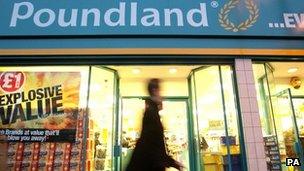Poundland eyes 1,000 UK shops as sales grow
- Published

Poundland aims to have 1,000 stores in the UK
The discount retailer Poundland is planning to expand as its sales continue to grow.
The firm, which already has 458 stores in the UK and Ireland, plans to open 1,000 stores in the UK "over time".
The decision comes after the chain saw a 15% rise in total sales to £880m in the year to the end of March.
"The discount sector is now a mainstream feature of the UK retail scene," said Poundland boss Jim McCarthy.
"Over time I'm confident that we will have over 1,000 Poundland stores in the UK," he added.
Poundland, which sells all its items priced at £1 or less, served 4.5m customers each week in the 12 months to March, driving its pre-tax profit before exceptional items up 29 % to £23.1m.
It opened 69 new stores over the year, including 17 in Ireland where it operates under the Dealz brand and items are priced at 1.49 euros.
Mr McCarthy said its rapid expansion in Ireland - where it has gone from just two stores in 2011 to 26 now - demonstrated its potential for further international growth.
"We have the capability to generate positive financial returns in new geographies quickly," he said.
West Midlands-based Poundland was bought by private equity firm Warburg Pincus three years ago for around £200m.
It hired Andrew Higginson, Tesco's former finance director, as chairman last year.
Possible float?
There has been speculation that Poundland could float to become a publicly listed company. The strong results mean the possibility of an initial public offering (IPO) has been rumoured once more.
Mr McCarthy said he understood the strong performance "would prompt some of the questions" (about an IPO) but declined to comment further.
Neil Saunders, managing director at retail consultancy Conlumino, said he believed a flotation was a possibility, but not immediately.
"It's got to a size that's pretty impressive now and there has to be a next step whether it's sold on or goes public."
Discounters rule
Discount retailers have outperformed the market in the economic downturn as cash-strapped consumers have sought to make savings. On Monday, Aldi reported 2012 profit had more than doubled.
Mr Saunders said Poundland had done well because it was "very much in tune with the consumer mindset at the moment."
He said its low price point for all products was particularly attractive to consumers because it stopped them overspending.
"In other stores there is a temptation to overspend. At Poundland the low price point puts temptation out of the way and means people genuinely save money."
- Published27 February 2013
- Published12 February 2013
- Published12 February 2013
- Published11 December 2012